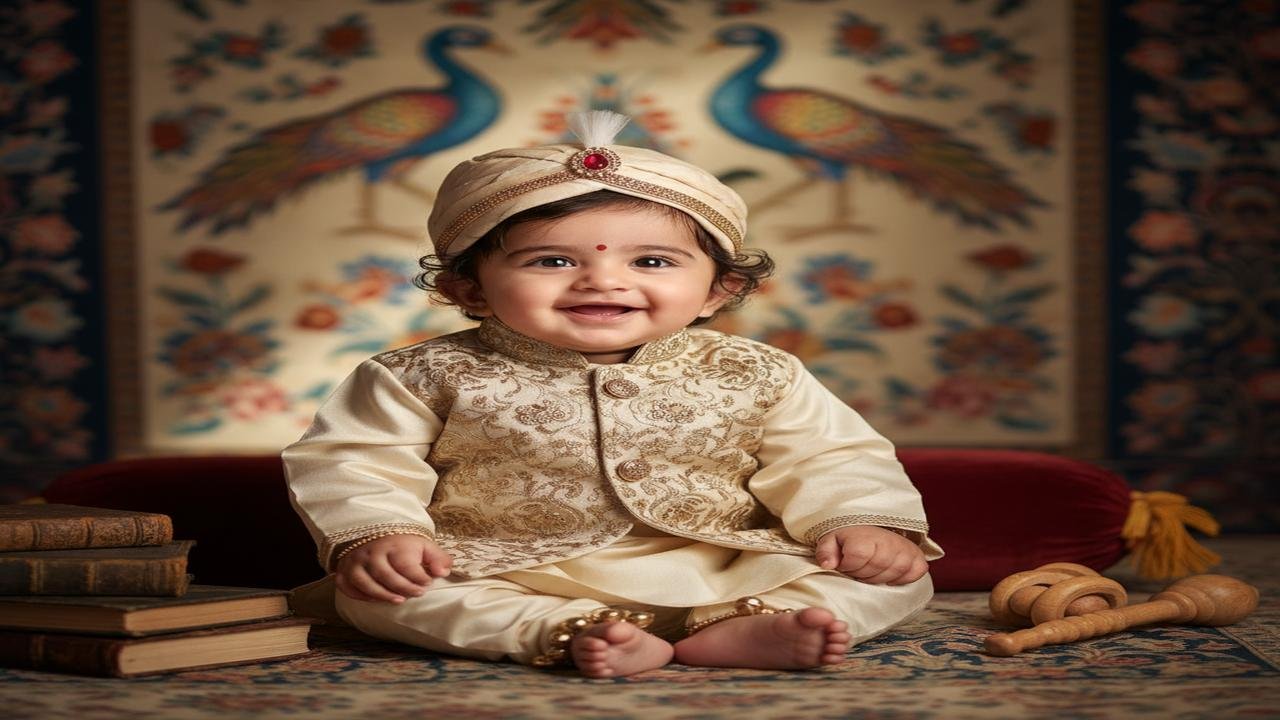10 Indian baby names inspired by royal heritage and titles

Introduction
Choosing a baby name rooted in royal heritage can connect a child to stories, duties and aesthetic registers that have shaped South Asian culture for millennia. This list offers ten names inspired by kingship and regal titles — with brief etymologies, historical or scriptural notes, regional use and friendly short forms. I use a few Sanskrit glosses on first mention (for example, rāja — king; rāṇī — queen) and try to remain neutral across interpretive lines: epics, Purāṇas and regional histories often treat these words differently, and naming customs vary widely by community.
How to read this list
- Each entry gives meaning, likely gender usage, a short cultural or scriptural note and common nicknames.
- Some names are direct titles; others are personal names borne by famous kings and saints. In some communities an honorific may be less common as a given name — check family and caste traditions.
- Many families observe a naming ceremony (namakarana). Communities often schedule it between the 11th and 12th day after birth, though practices differ — consult elders or a priest if you follow a ritual calendar.
Ten names inspired by royal heritage and titles
1. Rajendra
- Meaning: “Lord of kings” or “king of kings” (rāja + Indra used as ‘lord’).
- Gender: Traditionally male.
- Notes: A historic regnal name (e.g., Rajendra Chola I). Connotes sovereignty and leadership; used across India with strong usage in South India.
- Short forms: Raj, Raju, Endra.
2. Rajeshwari
- Meaning: “Queen of kings” or “sovereign lady” (rāja + īśvarī — female ruler).
- Gender: Female.
- Notes: Blends royal title with the honorific used for goddesses and respected women; common in Vaishnava and Śakta devotional contexts.
- Short forms: Rani, Raj, Ishwari.
3. Samrat
- Meaning: “Emperor” or supreme sovereign (sam + rāt—a ruler whose sway is complete).
- Gender: Typically male, increasingly used neutrally in modern naming.
- Notes: The term appears in Purāṇic lists of great rulers and in inscriptions. In Buddhist and Jain lists a chakravartin (see below) is a related imperial ideal.
- Short forms: Sam, Rat.
4. Adhiraj / Adhiraja
- Meaning: “Supreme king” or principal ruler (adhi — above/over + rāja — king).
- Gender: Male.
- Notes: Conveys seniority and responsibility rather than mere pomp. In classical material, prefixes like adhi‑ mark precedence or preeminence.
- Short forms: Adi, Raja.
5. Mahendra
- Meaning: “Great Indra” (a name that fuses maha — great + Indra — often used as a royal honorific).
- Gender: Male.
- Notes: Used by kings and nobles; carries both divine and regal resonance. Appears in genealogical lists of dynasties (e.g., Ikshvāku lineage references).
- Short forms: Mahen, Hendry (modern variant).
6. Chakravartin / Chakravarthi
- Meaning: “Wheel‑turner” — an ideal universal ruler whose chariot wheel rolls everywhere (chakra — wheel + vartin — one who turns/rolls).
- Gender: Traditionally male as a title; variants are used as names or surnames in many regions.
- Notes: The ideal appears in Hindu, Buddhist and Jain texts. In Purāṇas and epics the term is descriptive of sovereignty and duty; its connotation can be spiritual as well as political.
- Short forms: Chakri, Varthi.
7. Rana
- Meaning: Historically a martial/ruling title in Rajput and certain hill polities; in modern use it is a short, strong personal name.
- Gender: Mostly male, sometimes used as a family name.
- Notes: Strongly associated with regional Rajput history and identity in Rajasthan, Gujarat and neighbouring states; sensitive to regional pride and context.
- Short forms: Ran, Ranu.
8. Rajashri (Rajasri)
- Meaning: “Royal splendour” or “prosperity of the kingdom” (rāja + śrī — auspiciousness/wealth).
- Gender: Female.
- Notes: Evokes dignity and auspiciousness; popular in many linguistic regions with devotional overtones.
- Short forms: Raji, Shri.
9. Vikram / Vikramaditya
- Meaning: Vikram — valour, vigour; Vikramaditya — “Sun of valour” or a famed royal title borne by many legendary and historical kings.
- Gender: Male.
- Notes: Vikramaditya is a classical ideal king celebrated in legends and courtly lore; used widely across India as a name suggesting courage and righteous rule.
- Short forms: Vik, Vicky, Aditya.
10. Bharat
- Meaning: Name of a legendary emperor (King Bharata) and the classical name associated with the land; implies kinship, duty and sovereign lineage.
- Gender: Male (widely used as a national and personal name).
- Notes: Resonant for families who wish a name tied to the broader cultural imagination rather than a personal title; in some traditions Bharata is celebrated in the epics as an exemplar of rulership and sacrifice.
- Short forms: Bharat, Barry (informal modern use).
Choosing respectfully and practically
- Think about the social or ritual implications of a title as a given name — in some communities an honorific title can feel presumptuous; in others it’s perfectly ordinary.
- Consider how the name sounds with your family name, regional pronunciation and possible short forms.
- Where relevant, check family naming customs and consult elders if you plan a traditional naming ceremony.
Final note: The meanings given here reflect common Sanskrit etymologies and historical usage; local traditions and devotional readings add many layers of meaning. If you want, I can provide region‑specific variations (Marathi, Tamil, Bengali, Kannada) or a shortlist narrowed by syllable count, gender or astrological considerations.
